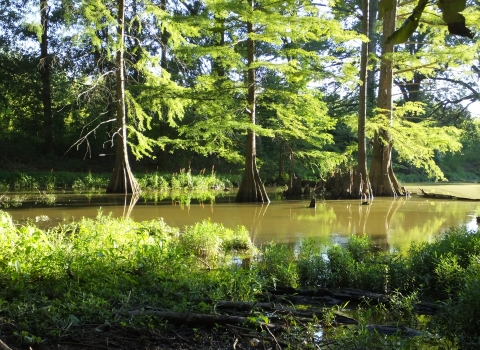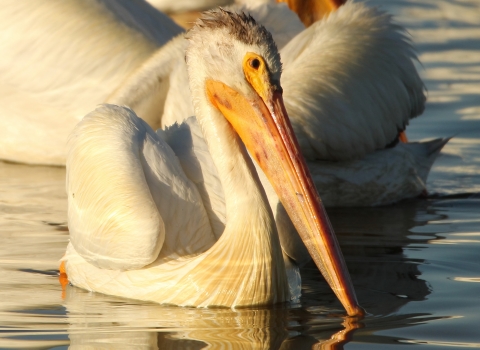The U.S. Fish and Wildlife Service is awarding more than $6.4 million to federally recognized Tribes to benefit fish and wildlife resources and their habitats. This year’s funding will support 36 Tribes for conservation projects across 17 states, benefiting a wide range of wildlife and habitat, including species of cultural or traditional importance to Indigenous communities.
“Our success in achieving shared conservation goals depends on our relationships, knowledge-sharing and co-stewardship with federally recognized Tribes,” said Service Director Martha Williams. “By respecting and supporting Tribal interests and needs, we can improve and enhance fish, wildlife and natural and cultural resources for the benefit of all.”
The Tribal Wildlife Grants Program helps fulfill federal trust responsibilities and achieve Tribal sovereignty by expanding Tribes’ natural resource capacity. Since its inception in 2003, including this year’s grants, the competitive Tribal Wildlife Grants Program has awarded more than $118 million to Native American and Alaska Native Tribes, providing support for 662 conservation projects.
The Biden-Harris administration’s America the Beautifulinitiative is a locally led, voluntary conservation and restoration effort that aims to address the nature and climate crises, improve equitable access to the outdoors, and strengthen the economy. This effort calls upon local, state and federal leaders to honor Tribal sovereignty and support the priorities of Tribal nations when making decisions related to sustainable land management and the conservation of natural, cultural and historical resources.
Tribal communities hold some of the most important conservation lands in the United States. Over 100 million acres of habitat are influenced or managed by the nation’s 574 federally recognized Tribes, who have stewarded their lands since time immemorial.
Tribal Wildlife Grants help Tribes develop increased management capacity, improve and enhance relationships with conservation state partners, address cultural and environmental priorities, and help train the next generation of conservationists by engaging Native students interested in fisheries, wildlife and related fields of study. Some grants have been awarded to support recovery efforts for federally listed threatened and endangered species.
Examples of projects approved this year include:
Crow Tribe of Indians in Montana (Black-footed Ferret Recovery in Crow Country) - $199,704 to enhance black-footed ferret recovery, increasing the population from 6 to 10 breeding pairs and hiring staff to support work occurring on the Crow Reservation.
Chickasaw Nation in Oklahoma (The Chickasaw Nation Kullihoma Waterfowl Habitat Management Project) - $139,034 to identify, enhance and protect vital waterfowl habitats on the Kullihoma Reservation through crop planting and installation of duck boxes, benefitting wading birds, reptiles, amphibians and aquatic furbearers and their wetland habitats.
Lac Courte Oreilles Band of Lake Superior Chippewa in Wisconsin (Lac Courte Oreilles Ma'iingan Relationship Plan) - $110,510 to update the 2013 Ma’iingan (gray wolf) management plan to better reflect Tribal Ecological Knowledge and contemporary ecological, biological and social science for this culturally important species.
Native Village of Tazlina in Alaska (Wolf Pack Monitoring and Population Estimates of Ahtna’s Eastern Territory) - $199,600 to conduct comprehensive research and enhance understanding of wolf pack range, distribution and diet within the eastern portion of the Ahtna Territory, an area that has not been studied for over 30 years.
Pyramid Lake Paiute Tribe in Nevada (Integrated Population Monitoring of Recovering Bighorn Sheep- $196,633 to support preservation and recovery of the recently reintroduced, highly vulnerable California bighorn sheep in the Lake Range through public outreach and monitoring.
Rappahannock Tribe in Virginia (Rappahannock Tribe Herring and Oyster Restoration Project) - $199,954 to conduct genetic research and build a mobile aquaculture unit to propagate river herring and Rappahannock River oysters, restoring Tribal access to cultural food sources and providing job opportunities for Tribal citizens.
Shoalwater Bay Indian Tribe in Washington (Western Snowy Plover and Streaked Horned Lark Habitat Management Plan) - $186,834 to improve the conservation status of the western snowy plover and streaked horned lark by managing nonnative species, replanting traditional plants, restoring key habitats, and increasing the resilience of coastal dune and shoreline habitats to withstand erosion and flooding and increase shellfish and fish resources.
Tunica-Biloxi Tribe of Louisiana (Tunica-Biloxi Rivercane Restoration) - $159,637 to restore rivercane and longleaf pine on reservation lands in Avoyelles and Rapides parishes, helping to restore and manage habitat for wildlife in a manner consistent with cultural traditions.
The grants are provided exclusively to federally recognized Native American and Alaska Native Tribal governments and are made possible under the Related Agencies Appropriations Act of 2002 through the State and Tribal Wildlife Grants program.
Get additional information about the Service’s Native American Programs.
-FWS-
The U.S. Fish and Wildlife Service works with others to conserve, protect and enhance fish, wildlife, plants and their habitats for the continuing benefit of the American people. For more information, visit www.fws.gov and connect with us on social media: Facebook, Instagram, X (formerly known as Twitter), LinkedIn, Flickr and YouTube.



